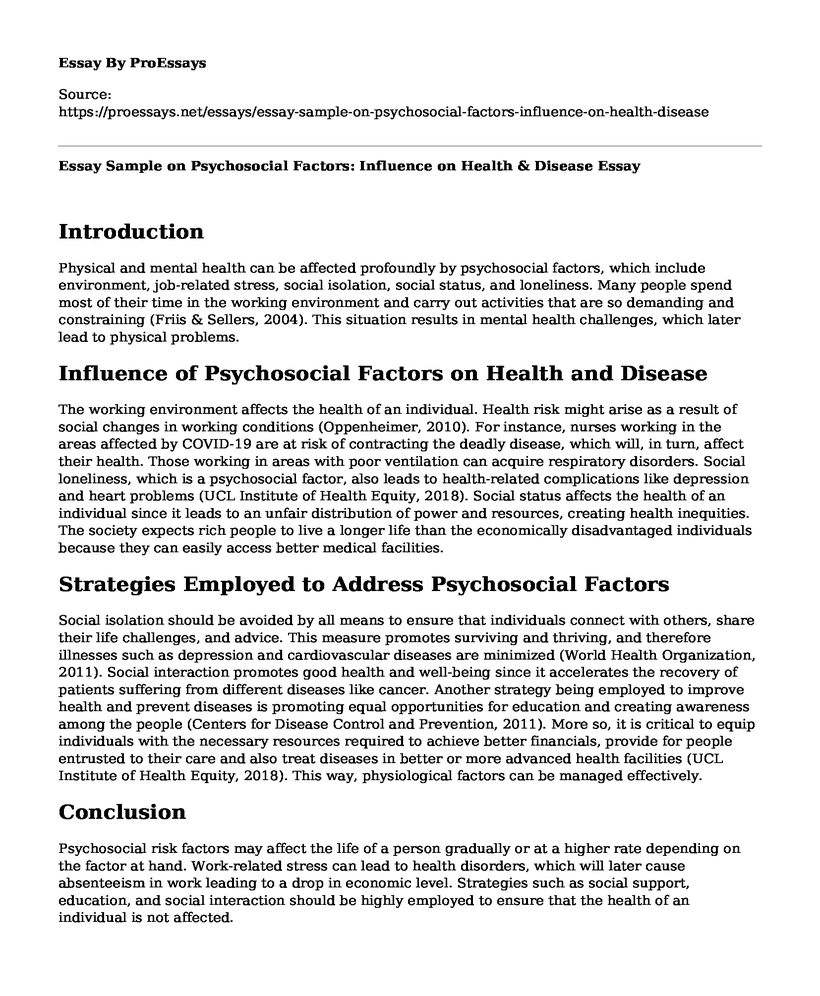Introduction
Physical and mental health can be affected profoundly by psychosocial factors, which include environment, job-related stress, social isolation, social status, and loneliness. Many people spend most of their time in the working environment and carry out activities that are so demanding and constraining (Friis & Sellers, 2004). This situation results in mental health challenges, which later lead to physical problems.
Influence of Psychosocial Factors on Health and Disease
The working environment affects the health of an individual. Health risk might arise as a result of social changes in working conditions (Oppenheimer, 2010). For instance, nurses working in the areas affected by COVID-19 are at risk of contracting the deadly disease, which will, in turn, affect their health. Those working in areas with poor ventilation can acquire respiratory disorders. Social loneliness, which is a psychosocial factor, also leads to health-related complications like depression and heart problems (UCL Institute of Health Equity, 2018). Social status affects the health of an individual since it leads to an unfair distribution of power and resources, creating health inequities. The society expects rich people to live a longer life than the economically disadvantaged individuals because they can easily access better medical facilities.
Strategies Employed to Address Psychosocial Factors
Social isolation should be avoided by all means to ensure that individuals connect with others, share their life challenges, and advice. This measure promotes surviving and thriving, and therefore illnesses such as depression and cardiovascular diseases are minimized (World Health Organization, 2011). Social interaction promotes good health and well-being since it accelerates the recovery of patients suffering from different diseases like cancer. Another strategy being employed to improve health and prevent diseases is promoting equal opportunities for education and creating awareness among the people (Centers for Disease Control and Prevention, 2011). More so, it is critical to equip individuals with the necessary resources required to achieve better financials, provide for people entrusted to their care and also treat diseases in better or more advanced health facilities (UCL Institute of Health Equity, 2018). This way, physiological factors can be managed effectively.
Conclusion
Psychosocial risk factors may affect the life of a person gradually or at a higher rate depending on the factor at hand. Work-related stress can lead to health disorders, which will later cause absenteeism in work leading to a drop in economic level. Strategies such as social support, education, and social interaction should be highly employed to ensure that the health of an individual is not affected.
References
Centers for Disease Control and Prevention. (2011). CDC health disparities and inequalities report-the United States, 2011. Morbidity and Mortality Weekly Report, Supplement, (60), 1-114. Retrieved from http://www.cdc.gov/mmwr/pdf/other/su6001.pdf. [Read pages 11-32]
Friis, R. H & Sellers, T. A. (2004). Epidemiology for public health practice (5th ed.). Sudbury, MA: Jones& Bartlett.
Oppenheimer, G. M. (2010). Framingham Heart Study: The first 29 years. Progress in Cardiovascular Disease.
UCL Institute of Health Equity. (2018). 'Fair society healthy lives' (The Marmot Review). Retrieved from http://www.instituteofhealthequity.org/resources-reports/fair-society-healthy-lives-the-marmot-review
World Health Organization. (2011). Social determinants of health. Retrieved from http://www.who.int/social_determinants/en/
Cite this page
Essay Sample on Psychosocial Factors: Influence on Health & Disease. (2023, May 01). Retrieved from https://proessays.net/essays/essay-sample-on-psychosocial-factors-influence-on-health-disease
If you are the original author of this essay and no longer wish to have it published on the ProEssays website, please click below to request its removal:
- Unconditional Love Song
- The Elderly as a Vulnerable Population Essay
- Diabetes in Texas and Agricultural Projects in San Antonio Essay Example
- Opioid Crisis: Declared a State Emergency by US President - Essay Sample
- Reflective Essay in Nursing: Examining Cultural Contexts
- Essay Example on Emergency Management Plan: Onsite Childcare & Partnerships
- Paper Example On Nurses Must Evaluate Needs of Patients Undergoing Weight Loss Surgery







